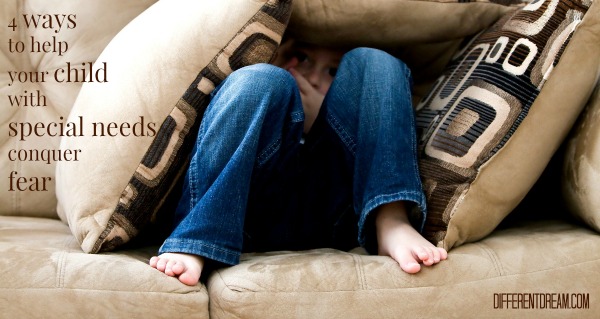How To Help Your Child with Special Needs Conquer Fear

Please welcome guest blogger Trish Shaeffer to Different Dream today. She’s here to share what she’s learned about how to help her child with special needs conquer fear.
How to Help your Child with Special Needs Conquer Fear
Everyone, from the youngest child to the oldest adult, experiences fear and anxiety at one time or another. Feeling anxious in a particularly uncomfortable situation never feels very good. However, with kids such feelings are not only normal, they’re actually necessary. Dealing with anxiety teaches young people how to handle unsettling experiences and challenging situations of life. Fear or anxiety can also keep kids safe, although too much fear may hinder a child’s exploration or understanding of the world socially, personally, and academically.
Anxiety, sensory processing disorder and OCD make the world a scary place for my son who has special needs. Loud noises are terrifying. So are bright lights and strange places. So, how do we help our kids with special needs conquer their fears in a healthy way?
Step #1
The first step is recognizing the fear is real. If it’s real to your child, it should be real to you, too. You may think it’s silly to go along with the whole “monster under my bed” check, but do it. Never belittle a child’s fears because that won’t make them go away. Instead, grab that “anti-monster spray” and get that critter out from under the bed. You’ll be your child’s hero!
Step #2
Provide support and gentle care so you approach your child’s fear as a team. Children who can visualize the intensity of the fear on a scale of 1 to 10 (1 being not too scary and 10 being totally terrifying) may be able to see the fear as less intense then first imagined. So teach your child to rate his or her fear. The monster under the bed might rate a 6, while a shot at the doctor’s office may be a 10.
Step #3
Teach coping strategies. For example, my son is terrified of strange places. Instead of avoiding them or telling him to stop being silly, I make myself his safe haven. I encourage my son to venture away from me ever so slowly while assuring him that he can always come back to me. I also use positive statements like, “You can do this” or “It’s okay; I’m here.” I repeat these statements in fearful situations to calm his mind and distract him from the fear. Relaxation techniques like deep breathing are also helpful.
Step #4
Stay calm. Refuse to get worked up in fearful situations. Don’t push your fear on to your child. I am afraid of heights, but I am not going to cause a scene about it in front of my son.
These tricks help my son not only recognize his fear, but move through it while easing his mind. They don’t work in a day, but they can help a child with special needs to conquer fear.
My son, now 6 years old, is no longer frightened in strange places–as long as he has his mommy in eyesight. Baby steps! Soon he will be out exploring the world on his own, without me as his safety net.” Until that happens, we will continue to take one day at a time.
Do you like what you see at DifferentDream.com? You can receive more great content by subscribing to the quarterly Different Dream newsletter and signing up for the daily RSS feed delivered to your email inbox. You can sign up for the first in the pop up box and the second at the bottom of this page.

By Trish Shaeffer
Trish Shaeffer mom of 3 active boys, a 9-year-old and 5-year-old twins who were born 2 months early and have special needs. She’s a peer supporter for Parent to Parent and volunteers with the United Cerebral Palsy Network, Special Olympics, and the United Way. She’s also an equine volunteer at Leg Up Farm. She’s married to her best friend and biggest supporter, Chris Shaeffer.
Subscribe for Updates from Jolene
Related Posts
When Special Needs Parenting Guilt Tries to Steal Your Joy
Guest blogger Lisa Brown explains how you can cope when special needs parenting guilt tries to steal your joy.
Why Is Expressing Gratitude Especially Important for Families with Disabilities?
Why is expressing gratitude especially important for families with disabilities? Guest blogger Kristin Faith Evans provides three reasons.
Organizational Strategies Are Saving My Life Right Now
In the midst of the chaos of caregiving, I’ve found that organizational strategies are saving my life right now.






0 Comments